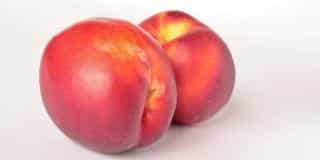

Nectarine is a fruit with many benefits that are great for health.
Called Prunus Persica nucipersica, nectarine belongs to the same family as the peach: the Rosaceae family.
The nectarine tree requires full sun soil and protection from strong winds. This is a hardy tree that can cope with temperatures as low as 5°F (-15°C) or -4°F (-20° C).
This very sweet, tasty fruit is a must-have in summer.
The nectarine is also an excellent fruit for both health and beauty.
When used in cooking, it will delight your taste buds and refresh!
The nectarine has been known since Greek and Roman times. Like the peach, it is said to be native to China; Alexander the Great brought it to Europe.
The nectarine, a special, smooth variety, was mentioned in French and Old English records in the XVIth century, as a mutation that removed the velvet from the peach’s fruit.
Nectarine has high water content, 88%. On top of being refreshing, nectarine is a diuretic.
It also demonstrates laxative properties. Indeed, nectarine contains fiber which speeds and regulates intestinal transit.
Nectarine has high amounts of antioxidants. These protect our body from cell ageing and certain cancers.
Betacarotene is the pigment that gives the nectarine its color.
Nectarine is a source of potassium with 210 mg / 3.5 oz (100 g). This mineral plays a key part for the body, specifically in regulating arterial blood pressure. Nectarine thus ensures proper functioning of your cardiovascular system.
Topical use of nectarine leaf poultices soothes burns.
A good source of iron, nectarine combats anemia. Nectarine also provides calcium and magnesium.
Nectarine is not contra-indicated for pregnant women.
Calorie intake of nectarine:40 to 60 kcal / 3.5 oz (100 g). Search how to cook with and eat nectarine to avail of its health benefits. This calorie-poor food item is part of a balanced diet and weight-loss diet!
Nectarines are simply amazing in desserts. It can be eaten freshly picked both with and without the peel (rinse well beforehand). But it’s also possible to prepare compote or sauce and mixed fruit salad. Nectarine is easily paired with other fruits: apricot, strawberry, blackberry …
For the most sweet-toothed ones out there, nectarine can also be prepared in pie, muffins, cakes and crumbles.
This very refreshing fruit makes for delicious ice cream or smoothies.
It is perfect paired with cottage cheese.
Nectarine-apple lollipops!
And why not sweet-n-sour:
Cut your nectarine in cubes in the frying pan, with a dab of butter, to pair with your rice, meats and fish. Add a few almonds for a little more crunch.
Toss nectarine quarters in your regular mixed salads.
Nectarine is a gold mine for our health. It cares for your skin. Indeed, it acts as a skin tonic, ensures proper cellular regeneration and protects skin from UV rays.
A moisturizing face mask for toned, luminous skin: Mash a nectarine and a peach together.Add one or two table spoons of cottage cheese. Apply mixture to clean skin. Let it seep in for a while and rinse with clean water.
Eat nectarines to prepare your skin for tanning! The high levels of beta-carotene contained in nectarine will protect you from the harsh burning of the sun while ensuring you tan nicely.
Nectarines must be chosen at exactly the right moment, because they stop maturing once they’re picked.
The fruit must give slightly, the skin must be free of blemishes and wounds, and it must release a sweet fragrant smell.

Credits for images shared to Nature & Garden (all edits by Gaspard Lorthiois):
Slit nectarine by Explorer Bob under Pixabay license
Two healthy nectarines by Łukasz Cwojdziński under Pixabay license
Thanks for info on nectarines. Paid plenty at the store but,as you say, once picked they do not ripen. So I stewed mine with sour,yes very sour raspberries . Raspberries from San Diego….very sour….even with yogurt. So I lightly stewed all with honey and touch of almond essence. Think there is very little harm in stewing
fruit these days,with Covid etcetera.
Adding honey and almond essence is a great touch! Excellent way to make use of nectarines. It must have been a real treat! Stewing has for sure always been a way to do away with germs of all sorts, since the dawn of time it seems our ancestors caught on on that.
Had the compote next night with good old Birds’ custard. You are so
resourceful with such variety of uses. Must try the face mask. I remember in my youth doing the same with raw beaten eggs. Will promise to follow your ideas….but could we dumb down on the toenail fungus ads….kind of
off putting. Every success to you.Jean Palmer . Keep up the anonymity..
Very welcome.